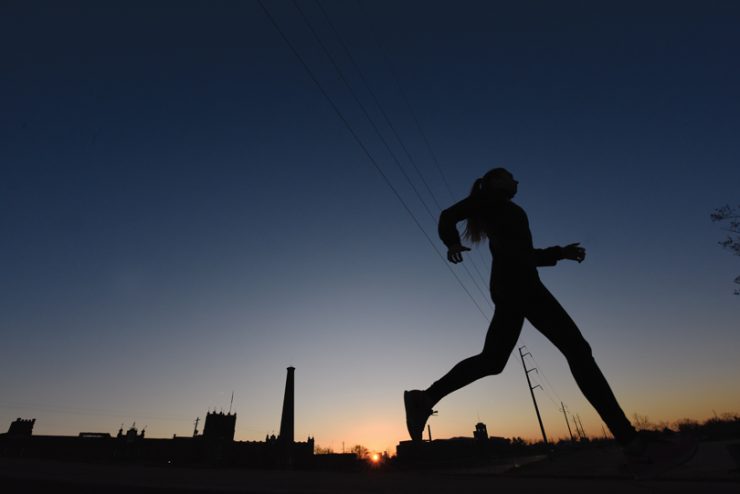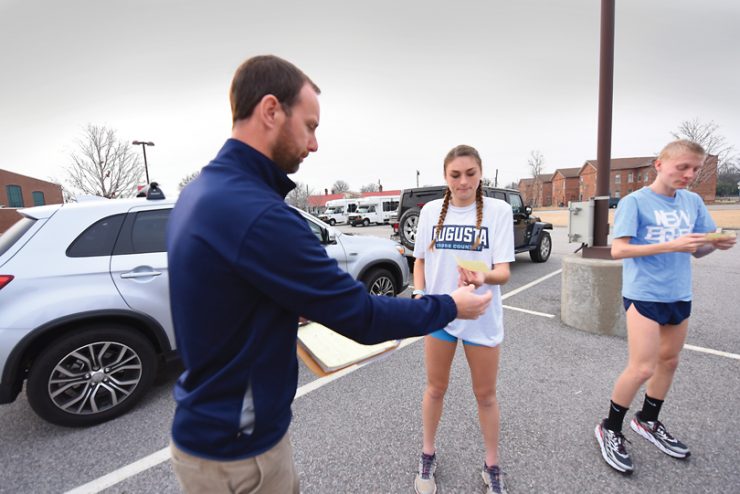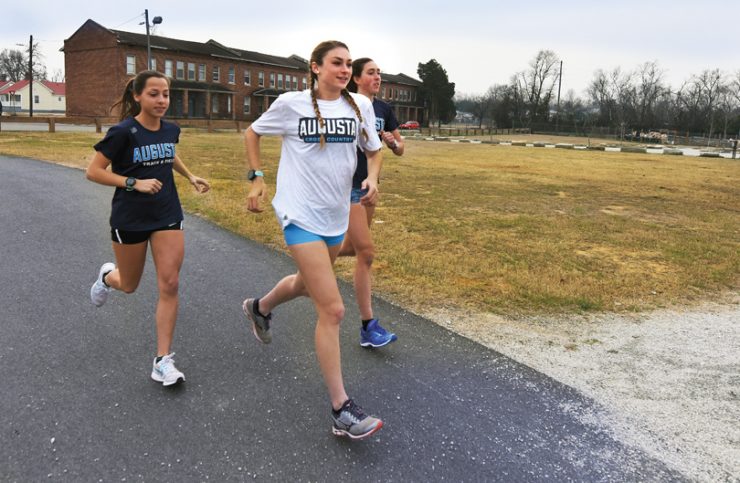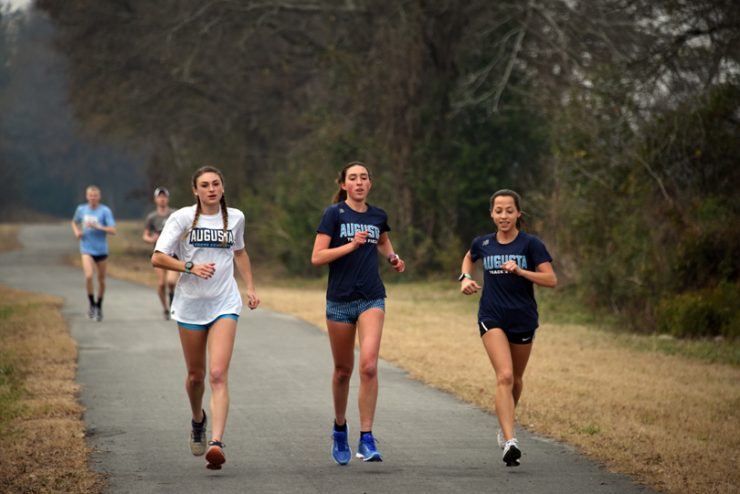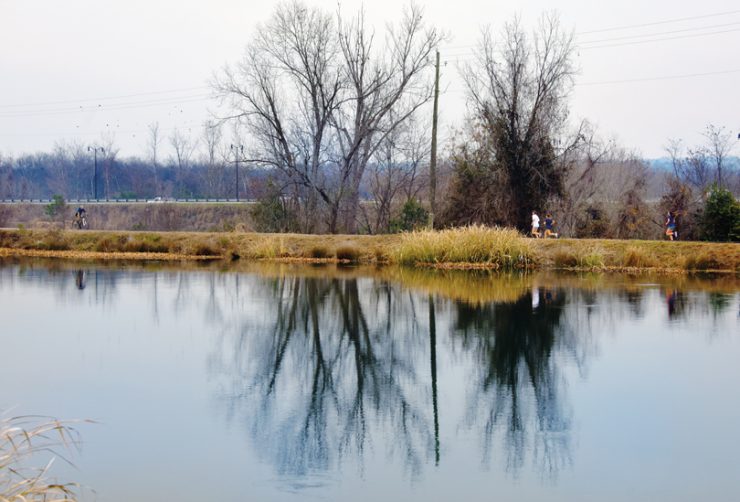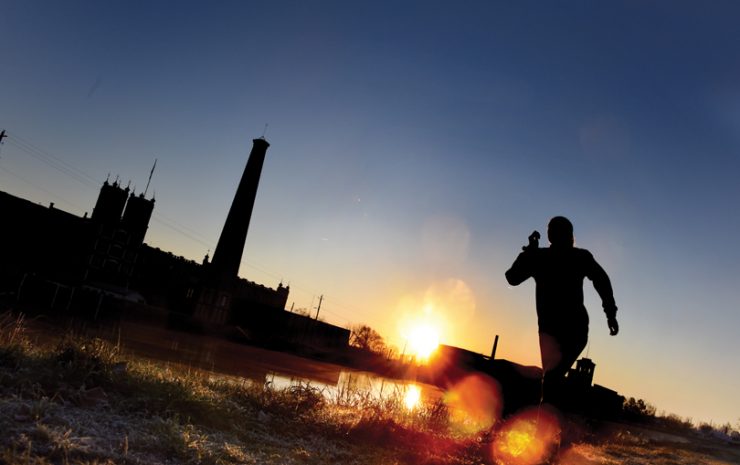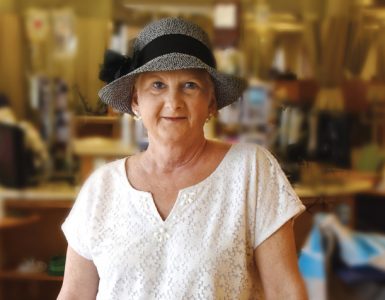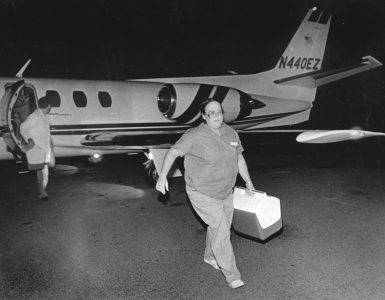One runner’s fight against doubt, anemia and the desire to quit
On race days, Lara Way has her shoes on before the sun comes up. Hundreds of five o’clock starts at the Augusta Canal have led her to this moment. Hundreds more will follow.
Before she leaves her hotel room, she takes a moment to braid her hair. Two French braids, her new “signature look.” For those quick enough to catch a glimpse of her as she breezes by, it’s a brief change of scenery from the tree limbs and fallen leaves of each course.
From there it’s on to breakfast. She eats with her teammates two hours before toeing the line. Two is the magic number, the one she discovered her freshman year of high school and has sworn by ever since. Enough time to digest her food without feeling sluggish or held back.
On the ride to the meet, she listens to music. Classic rock. Van Halen, of “Running with the Devil” fame.
“I’m probably one of the only people my age you’ll meet who listens to Van Halen before a run,” she joked.
When the bus arrives at the meet, it’s go time. The jackets come off, the warm-ups begin and the spikes — runners’ cleats — go on. After a few strides and drills, it’s time for the lineup. No devils on the starting line, but there are plenty of demons. Fear. Worry. Doubt. It would be a stretch to say she’s conquered them. No runner ever does. Rather, over the years, she’s learned to to keep them at bay, to cope and see the race to its finish, win or lose.
“Once you’re on the start line and you’re looking out across the course, your mind’s racing,” Way said. “We repeat a phrase, ‘I can do this. I am strong. I am determined.’ You say it to yourself and your sisters. It helps.”
The phrases are a show of strength for Way and her fellow runners. A much-needed boost of confidence before the gun goes off and she’s alone again in the woods. But confidence didn’t, and doesn’t, always come naturally for Way. The path to the present has been a long and winding one.
It started when she was just 4 years old.
“My dad would get up on Friday mornings and he’d go for a run before work,” she said. “One morning, I woke up with him, and as he was getting ready for his run, I said, ‘I want to go with you, Dad.’”
She ran her first 5k at 5 — the Coon Dog Day 5k, in Saluda, North Carolina. Shortly after, she and her family were back in Augusta. From there, another four years would pass before she tried her hand at a 10k.
“My parents had signed up for the Phinizy Swamp 10k, and I decided I also wanted to run it,” Way said.
At 9 years old, she was ready. She was also, predictably, quite nervous.
“I was the youngest competitor they had ever seen,” she said. “It was intimidating, but for me, it also felt natural being surrounded by runners.”
Though running had become a cornerstone of her life by then, Way said it had never occurred to her to make running her sole focus. After moving back to Augusta from Saluda, she played soccer for the GA-SC Bulls (formerly the Augusta Patriots) Soccer Club. She played left midfielder, a physically demanding position that required her to run back and forth essentially all game. So, to keep her in shape during the fall off-season, Way’s mother made a suggestion.
“She said, ‘What do you think about maybe doing cross-country in the fall, just to stay in shape?’” Way said. “She thought it would probably make me a better midfielder.”
The result was a training overlap and, maybe, a training overload.
“I trained all summer,” Way recalled. “I was also playing soccer at the same time, so the first cross-country meet we had I ran in the morning, drove back to Augusta from Atlanta, played in a soccer game, scored three goals, then played in the championship match the following day.”
Two weeks later, while playing at Blanchard Woods, she twisted her knee going in to retrieve the ball from another girl. In the process, she pulled one of the tendons in her calf. The next several weeks saw her in a boot and crutches. Her sports medicine specialist told her what her coach, and her body, already knew: Running in two directions was getting her nowhere. Fast.
“My running coach at the time gave me an ultimatum,” Way said. “He said, ‘Lara, you are good, and you are fast, but you need to make a choice.’”
Faced with a life-altering decision, Lara chose to follow her passion. She followed it all the way through high school and even on to the University of Georgia, where her family has attended since the early 1900s. She had grown up watching Georgia football and listening to her parents’ experiences. The chance to go to a big school, for a runner with big ambitions, seemed like a perfect fit.
But bigger, Way learned, isn’t always better.
“I went to school and my freshman year, my recruiting class had 19 girls in it,” Way said. “That’s almost unheard of. It made it very difficult to get any individual attention from a coach.”
On a team with dozens of runners, it’s expected no athlete will get the lion’s share of attention. Unfortunately, when it comes to running, training isn’t one-size-fits-all. In her freshman year, Way, a competent, talented runner, was injuring herself more and more. Her every achievement, chased by a setback.
She was a good runner. She knew she was. But her times weren’t reflecting it. Worse, she wasn’t faring much better in class.
“It was also really tough to go to a class with 500 people,” she said. “I’m very big on personal connections and knowing your teachers and classmates. Those opportunities just weren’t there.”
In a short amount of time, Way had gone from feeling like a runner with a purpose to feeling like a small fish in very big pond. She was alone. So, with her self-confidence waning, she made another life-changing decision. She decided to come home.
“That March, I emailed Coach [Adam] Ward,” Way said. “I didn’t want to look around at other schools. I wanted to come home.”
Ward has been Augusta University’s head cross-country and men’s and women’s track and field coach for the past 14 years. When Way contacted him, he said, they spent nearly an hour on the phone discussing Way’s training at UGA.
“I was in Greeneville at the time, visiting a former athlete and just kind of checking out the city,” Ward said. “[Way] called, and I sat in the passenger side of the car while my wife and kids went in.”
Ward asked about Way’s background with running. What were her successes? What were her frustrations? What was she excited about when it came to running, and what were her plans for the future?
More importantly, though, Ward asked about the most important aspect of competitive running: Drive.
“My biggest question during the conversation was, was she even still interested in running?” Ward said. “Where was her passion? You know, some people want to run, and others have a fire — they’ll do whatever it takes. Those are the folks you want to find as a coach because they’re intrinsically motivated.”
Working with an athlete who’s been injured multiple times can be tricky. Helping a runner maintain confidence, especially after she’s watched her times get slower and slower, is a hard slog. Over the years, Ward has earned something of a reputation for “rehabilitating” runners other schools have let down, though. Way was no exception.
“I’m not saying I’m the wizard or anything, but we joke that we get a lot of ‘broken’ runners to run pretty well here, if they’re patient with us,” Ward said. “Before she came to us, I think Lara was injured more than she ran. She’s really been able to turn it around.”
One of the issues Way struggled with, both at UGA and here in Augusta, is anemia. It’s a common ailment for runners. Especially for women. As athletes exercise, their red blood cells rupture — a process called exercise-induced hemolysis. When those red blood cells die off, iron levels drop. If properly treated with the right dosage of iron medication, it’s a moderate inconvenience. Left ignored, it can be crippling.
“I’ve battled with [anemia] for the past four years or so of running,” Way said. “This year, Coach Ward and I looked at my training plan and where my iron medication was, and we got everything into focus.”
Working together, Way and Ward adapted her training plan to taper as the season went on. The hardest workouts came at the beginning of the season. As the months wore on, and Way’s iron levels rose, her training sessions slowed down, and Way’s performance improved. Dramatically.
Not long after, she ran the fastest women’s cross-country 5k in university history: 17 minutes, 53 seconds. The news came as a surprise. In fact, it was such a shock that when Way looked down at her watch and realized she was on pace for a personal record at the 2-mile mark, she panicked.
“I looked down and saw I was 11 minutes and 30 seconds into the run, and I thought, ‘Oh, no, what have I done,’” she said. “I had this moment of panic thinking, if I just got a personal record on the 2, I don’t know if I can keep up the pace.”
Doubt can be a killer in the middle of a race. Those demons from the starting line? They don’t scatter when the referee’s gun goes off. They run the full race, sprinting alongside runners as a pack, convincing them, wordlessly, that the distance is too far, the pace too fast, the cost of victory too great. For a lone runner, being pulled under is a real concern.
“Being confident in myself is hard because you’re in the woods, you’re alone, you know,” she said. “It isn’t a big soccer field, where you can look up into the stands and see the people there to support you.”
In those quiet moments, it’s easy to trip over unpleasantries. Unhappy memories, like the roots of tall trees, sometimes spring up from the country soil.
A veteran, Way’s father, Peter, had his leg amputated after being injured in Afghanistan while rescuing a fellow soldier from a Humvee. After his accident, Way worried she’d lost the thing that made her an athlete in the first place: The ability to run beside her father.
“I just remember when I got the call that he was going to be in a wheelchair for the rest of his life,” Way said. “That was probably the hardest thing for me to digest. I wouldn’t go out for practice anymore, and I wouldn’t have my dad next to me or see him there, running with our dogs on their leashes.”
As devastating as the news was for Way, the thought of losing their relationship was crushing for her father.
“I think we both worried about the same things because so much of our relationship was built on activity,” he said. “It worried me a great deal.”
Like his daughter, though, Way isn’t one to be held down by physical limitations. Today, he’s training to compete for the U.S. in the biathlon at the 2018 Paralympics in March. He credits his children with helping to keep him focused and positive through the entire training process. Likewise, he hopes he can be an inspiration for them.
“I hope that I will always be the example for Lara of what perserverance is, and that you can overcome any obstacle in life if you are determined,” he said.
And he is. When the doubt creeps in, and the gently swaying pines begin to look more and more like leaning posts to her tired legs, Way said she thinks of her father, of the struggle he’s undergone and the success he’s found in adversity.
But he isn’t the only one she thinks of. She imagines her coaches, past and present, and the belief they placed in her. She thinks of her teammates, her sisters, giving each race their all. She dreams of the finish line, of the stopwatch ticking, and the joy not of winning but of doing her part for her team and her family. When those thoughts hit, the demons — the doubt, the worry, the fear — start to slip.
And she isn’t alone anymore.


